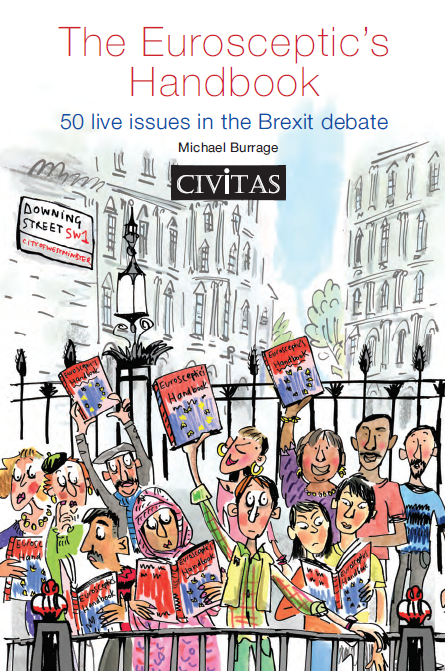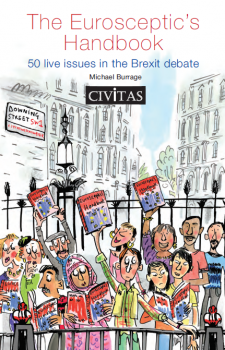The Eurosceptic’s Handbook: 50 live issues in the Brexit debate
Michael Burrage, May 2016
The Brexit debate that has taken hold of the country is one of the defining issues of our time. The outcome of the EU referendum in June will have ramifications that will be felt for generations to come.
But the discussion is curiously one-sided. The polls show that the British people are fairly evenly split between those who would stay and those who would leave – and very few would give the present arrangement a ringing endorsement. Yet all the resources of government and big business have been thrown behind an information campaign designed to ensure the UK remains a member of the EU at all costs.
The Eurosceptic’s Handbook tries to help rebalance the debate, and arm those with doubts about the EU with the counter-arguments they need to make an objective judgement. Michael Burrage, whose previous Civitas publications have earned praise for overturning the received wisdom about the EU’s supposed trade benefits, here takes a broader look at the pros and cons of EU membership.
Standing back from the spin and hyperbole of Project Fear, Burrage surveys the evidence from Britain’s involvement with Brussels since it joined the European Economic Community in 1973.
He exposes the flaws in the arguments that have been made along the way for Britain’s continued membership. He lays bare the costs – financial and democratic – to every UK citizen of sticking with the European project. And he explains why, if Britain votes to leave, it will have nothing to fear – and much to gain.
In the Media
Great EU trade lie: Brit exports to Europe are LOWER than before we joined single market, Express
UK’s share of EU single market exports plummets, iNews

About the Author
Michael Burrage is a director of Cimigo, which is based in Ho Chi Minh City, Vietnam, and conducts market and corporate strategy research in China, India and 12 countries in the Asia Pacific region. He is also a founder director of a start-up specialist telecom company which provides the free telephone interpreter service for aid workers and others where interpreters are scarce.
He is a sociologist by training, was a Fulbright scholar at the University of Pennsylvania, has been a lecturer at the London School of Economics and at the Institute of United States Studies, specialising in the comparative analysis of industrial enterprise and professional institutions. He has been a research fellow at Harvard, at the Swedish Collegium of Advanced Study, Uppsala, at the Free University of Berlin, and at the Center for Higher Education Studies and the Institute of Government of the University of California, Berkeley. He has also been British Council lecturer at the University of Pernambuco, Recife, Brazil, and on several occasions a visiting professor in Japan, at the universities of Kyoto, Hokkaido and Kansai and at Hosei University in Tokyo.
Download PDF Buy From Amazon
